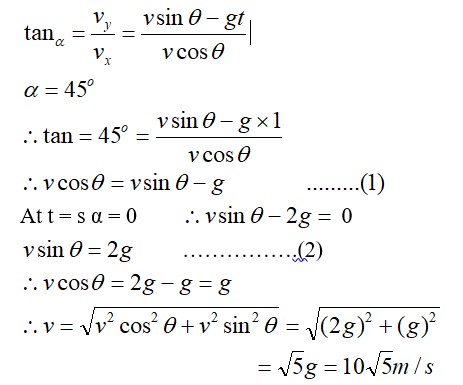4.23 For any arbitrary motion in space, which of the following relations are true:
(a) V average = (1/2) (v (t1) + v (t2))
(b) V average = [r (t2) - r (t1)] / (t2 – t1)
(c) V (t) = v (0) + a t
(d) R (t) = r (0) + v (0) t + (1/2) a t2
(e) A average = [v (t2) - v (t1)] / (t2 – t1)
(The 'average' stands for average of the quantity over the time interval t1 to t2)
4.23 For any arbitrary motion in space, which of the following relations are true:
(a) V average = (1/2) (v (t1) + v (t2))
(b) V average = [r (t2) - r (t1)] / (t2 – t1)
(c) V (t) = v (0) + a t
(d) R (t) = r (0) + v (0) t + (1/2) a t2
(e) A average = [v (t2) - v (t1)] / (t2 – t1)
(The 'average' stands for average of the quantity over the time interval t1 to t2)
4.23
(a) For any arbitrary motion of a particle average velocity cannot be expressed by this equation. False
(b) The arbitrary motion of the particle can be represented by this equation, True
(c) For arbitrary motion of the particle, the acceleration may also be non uniform. False
(d) The motion
Similar Questions for you
Please find the solution below:
after 10 kicks,
v? = 3tî v? = 24cos 60°î + 24sin 60°? = 12î + 12√3?
v? = v? – v? = (12 – 3t)î + 12√3?
It is minimum when 12 - 3t = 0 ⇒ t = 4sec
ω = θ² + 2θ
α = (ωdω)/dθ = (θ² + 2θ) (2θ + 2)
At θ = 1rad.
ω = 3rad/s and α = 12rad/s²
a? = αR = 12 m/s² a? = ω²R = 9 m/s² A? = √ (a? ² + a? ²) = 15 m/s²
a? = v? ²/4r
a_A? = (v? ²/r²) × r = v? ²/r
a_A = 3v? ²/4r
Taking an Exam? Selecting a College?
Get authentic answers from experts, students and alumni that you won't find anywhere else.
On Shiksha, get access to
Learn more about...

physics ncert solutions class 11th 2023
View Exam DetailsMost viewed information
SummaryDidn't find the answer you were looking for?
Search from Shiksha's 1 lakh+ Topics
Ask Current Students, Alumni & our Experts
Have a question related to your career & education?
See what others like you are asking & answering


